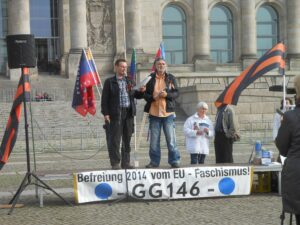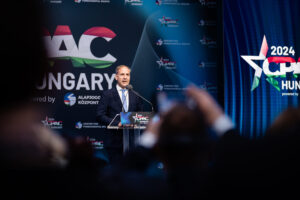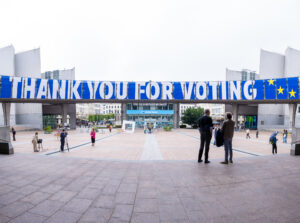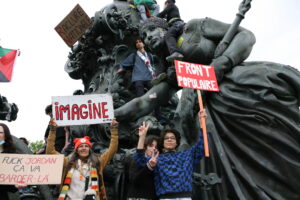Thuringia
In Thuringia’s state elections on September 1, 2024, the AfD secured 32.6% of the vote, becoming the strongest party. This result for the AfD in Thuringia is the highest result for a far-right party in the Federal Republic of Germany’s history. The result in Thuringia marked a 9.4% increase compared to 2019.
The second-largest party, the conservative CDU, garnered 23.6% of the vote. Meanwhile, the left-wing party “Die Linke,” led by the popular former Prime Minister Bodo Ramelow, received just 13.1%. The Social Democratic Party of Germany (SPD) obtained 6.1%, while the Greens failed to meet the threshold for re-entry into the state parliament, with only 3.2%.
In Thuringia, the AfD now holds a blocking minority, allowing it to effectively hinder future government decisions, including the election of constitutional judges or state laws.
The AfD’s leader in Thuringia is Björn Höcke, a key figure in the party’s openly fascist wing. Höcke has had connections with neo-Nazi Thorsten Heise, who is a neighbor of his and is believed to have written under a pseudonym for a neo-Nazi NPD magazine. Höcke advocates for an anti-Western alliance with Russia to counter what he calls the “rainbow empire.”
At an AfD event in Gera on December 12, 2023, Höcke called for the expulsion of millions of people from Germany. He suggested that Germany could “initiate measures” to restore its population and stated, “We will be able to live with 20-30 percent fewer people in Germany without any problems.”
Saxony
In the Saxony state elections on September 1, 2024, the AfD received 30.6% of the vote, a gain of 3.1% compared to 2019. The conservative CDU narrowly won with 31.9% of the vote. Despite the AfD’s strong showing, the CDU’s candidate, Michael Kretschmer, remained more popular according to the polls, compared to the AfD’s top candidate, Jörg Urban. “Die Linke” performed poorly, achieving only 4.5%, which left them below the 5% threshold for parliamentary representation. However, the party won two direct mandates in Leipzig.
Several AfD members of the Saxon state parliament are known to have ties to Russia and Belarus. For instance, AfD MP Jörg Dornau was re-elected. Since October 2020, Dornau has co-owned a company in Belarus called “Zybulka-Bel” with Yurij Kunitski. The company was granted 1,555.4 hectares of land for permanent use, including an onion plantation. According to a report by Reform.news, political prisoners from the Lida prison “Isolation Center for Offenders” (IZS) have been forced to work on this plantation, earning just five euros a day. Further investigations by Reform.news revealed that Dornau personally inspected the forced labor of these political prisoners.
Brandenburg
In the Brandenburg state elections on September 22, 2024, the AfD garnered 29.2% of the vote, marking a 5.7% increase from previous elections. The SPD remained the strongest party with 30.9%. Meanwhile, the conservative CDU received 12.1%, while the Greens, the Left Party, and the liberal FDP failed to enter the state parliament.
SPD’s lead candidate and Minister President Dietmar Woidke had tied his political future to the election, declaring that he would only remain Minister President if he managed to defeat the AfD in the polls.
Newcomer: “Bündnis Sahra Wagenknecht”
A notable newcomer in these elections was the newly formed BSW party, which received 11.8% of the vote in Saxony, 15.8% in Thuringia, and 13.5% in Brandenburg. The BSW was created following a split from the “Die Linke,” led by Bundestag member Sahra Wagenknecht. The party downplays Putin’s role in the war in Ukraine and promotes anti-migration and anti-gender ideology. The BSW’s success further weakened “Die Linke” and has made coalition-building beyond the AfD difficult in all three state parliaments without the involvement of the BSW.
Analysis
East Germany has a distinct political culture, shaped by its 40-year history as the German Democratic Republic (GDR) and its experience as part of the Eastern Bloc. The legacies of dictatorship, the political upheavals of reunification, and the following economic challenges continue to influence the region’s political landscape. Reunification brought mass unemployment, deindustrialization, and an exodus of people from rural and medium-sized towns. West German elites took over key positions after 1990, a persisting pattern. Unlike West Germany, which experienced social pluralization and cultural liberalization starting in the late 1960s, East Germany’s exposure to large-scale migration and independent political movements like the 1968 protests only began in 1990.
The recent state elections in Thuringia, Saxony, and Brandenburg revealed a significant decline in support for Germany’s governing coalition parties (SPD, Greens, FDP), with the exception of the SPD in Brandenburg. Federal politics significantly influenced these elections, with voters penalizing the traffic light coalition, especially the Greens. This result is partly due to a successful right-wing culture war against the coalition.
Other right-wing parties, besides the AfD, remained largely insignificant, with most failing to surpass 1% of the vote. The AfD rival party “Bündnis Deutschland” launched an intensive poster campaign, but its impact was minimal. Similarly, the right-wing CDU offshoot “WerteUnion,” which polls suggested could reach the 5% threshold, also failed, finishing with less than 1%. The AfD continues to dominate the extreme right-wing space, with only the “Freie Sachsen” reaching 2.2% in Saxony, which prevented the AfD from securing first place there.
Despite the AfD’s strong showing, surveys indicate that most voters in all three federal states oppose the party’s involvement in government.
Voter turnout was high, with 73.6% in Thuringia, 74.4% in Saxony, and 72.9% in Brandenburg. Many voters cast tactical ballots—voting SPD in Brandenburg and CDU in Saxony—to prevent the AfD from becoming the strongest party, a successful strategy.
The AfD’s gains were particularly striking among young voters. In Thuringia, 38% of voters under 35 cast their ballots for the AfD, a 15% increase from 2019. In Saxony, 31% of young voters supported the AfD, an 11% increase. This surge is tied to future anxieties and the AfD’s effective use of TikTok to reach young audiences. Additionally, many East Germans still perceive themselves as second-class citizens, and those who share this sentiment were more likely to vote for the AfD or the new BSW.
A disproportionate number of members of the working class also voted for the AfD. Key election issues included immigration, crime, and internal security, benefiting the AfD, the conservative CDU, and the anti-immigration BSW. Two Islamist attacks in Germany before the elections also intensified a racist and anti-Muslim discourse, which the far right capitalized on.
On May 31, 2024, an Islamist attacked a rally led by an anti-Muslim figure in Mannheim, Baden-Württemberg, injuring several people and killing a police officer. Another attack took place on August 23, 2024, at a city festival in Solingen, North Rhine-Westphalia, where a suspected Islamist killed three people and seriously injured three others. The “Islamic State” later claimed responsibility for the latter attack. These incidents fueled the far-right’s rise in the subsequent elections.
Outlook
The AfD emerged from the elections significantly strengthened. Its position as the strongest party in Thuringia, led by neo-fascist Björn Höcke, has bolstered the influence of the party’s hardliners, who advocate for a strategy of fundamental opposition and street demonstrations.
Based on initial exploratory talks, the AfD is expected to remain in opposition. However, the proposed government coalitions are fragile and divided on key issues, raising concerns about their stability. If these newly formed governments fail, the AfD stands to gain even further in the event of new elections.
The AfD has permanently rooted itself in eastern Germany and attracted a core electorate. It will be active here in the short and medium term and help shape politics and discourse.
At the same time, an extreme right-wing street movement, including neo-Nazis, is growing in the shadow of the nationalist party’s electoral success. These are likely to feel motivated to commit acts of violence as a result of the AfD’s electoral success.
There are fears of an escalation on the streets. At the same time, the existence of left-wing and emancipatory projects is at risk because the strengthened AfD and the conservative CDU are calling their state funding into question.








